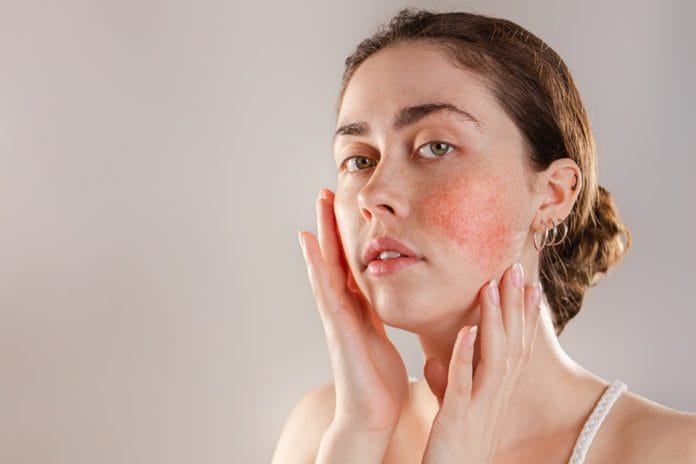A study called The Association Between Oral Health and Skin Disease recently appeared in the June 2020 edition of The Journal Of Clinical And Aesthetic Dermatology. They ask a question about two subjects that many people may not put together. Does a person’s oral health cause, or exacerbate, any dermatological issues that we know of, and if they do, why?
We ask for our patient’s medical history and current medications because we have already established that periodontitis and other oral problems can affect your heart, lungs, and even your brain. But what about our skin? Are there certain skin problems that go hand-in-hand with traditional oral hygiene problems that can be positively affected with great oral hygiene practices?
What did these researchers discover?
Specific Skin Diseases or Irritations
Not every skin disease can be lumped together, but a few related disorders were directly or indirectly linked to periodontitis and its many effects.
Aphthous Stomatitis
Patients who suffer from aphthous stomatitis tended to have an increase in oral health problems, much more than the average person without the disease. They suffered from a higher plaque index from reduced tooth brushing and oral infections seem to coincide with flare-ups in the disease.
The worse the flare-up, the less a person took care of their teeth in a vicious circle of chronic periodontitis.
Dermatitis and Eczema
Odontogenic infections and excessive gingival bleeding occurred much more in someone with a break-out of eczema or other general skin disorder classified as dermatitis, and the usual prescription of a steroid for such skin problems can even worsen the problem.
Those who suffer from dermatitis and eczema also have a higher tendency to be allergic to dental amalgam which specifically bothers the skin of a dermatitis patient. The good news is that children with skin conditions did not have an increased risk of dental caries.
Lichen Planus
There is a very strong connection between lichen planus and periodontal diseases and an increase in gingival bleeding. These patients usually have thicker concentrations of biofilm and calculus deposits because many have complained of pain while brushing their teeth.
Patients who suffer from lichen planus can greatly increase their quality of life with the disease by increasing their dental hygiene skills and fixing any dental problems as soon as they arise. The results were dramatic in several tests.
Pemphigoid
Pemphigoid tends to create oral lesions, much like lichen planus, that make brushing difficult and painful. Gingival scores (plaque index) were extremely high in these patients as well as general inflammation.
Pemphigoid is a serious autoimmune disorder that causes boils all over the body and in the mucous membranes. If you have someone with pemphigoid in your chair, it is essential to be as gentle as possible.
Each blister, besides being extremely painful, is filled with bacteria and creates an open wound when it bursts. The contents can cause further and even more serious problems in the mouth and these patients may only want to come in when they are in remission.
Pemphigus
Pemphigus is also exacerbated by poor oral health, though many, many other irritants worsen their situation. They, too, have lesions that can occur within the mouth, making tooth brushing and routine oral care very difficult, if not impossible, and very painful.
It may be essential for dental practitioners to ask for permission from a patient’s doctor or dermatologist before conducting any procedures on these patients due to the extreme likeliness of spreading infection.
Basically, an increase in dental care can worsen the pemphigus outbreaks and cause more problems than it helps.
Psoriasis
The strongest correlation between skin diseases and periodontitis happens in psoriasis patients, especially if they smoke, drink, or are overweight. Psoriasis patients suffer from more strep-related infections and irritating oral lesions has led to tonsillitis and more severe forms of periodontitis.
The oral microbiome of bacteria can cause psoriasis outbreaks, especially on the face and hands, and there is always a strong chance of cross-reactivity at any time.
All of these patients need to be given specific care while they are in our dental chairs and the level of knowledge that you have of your patient’s skin diseases will have to determine your approach.
Conclusion
This research team has concluded that chronic periodontitis does contribute to the worsening of already present skin disorders, and improvement in dental care and dental hygiene can cause positive outcomes in patients with many skin diseases.
At the same time, several skin diseases within the same family would not benefit from extra care or are not even able to withstand the extra attention due to pain or cross-contamination of bacteria.
But the truth is that the inflammatory pathways exacerbated by periodontitis directly affect your entire body, even your skin. A person’s quality of life may depend on decreasing inflammation in any way possible, but be knowledgeable about the difficulties they face every day because it will direct your care.
Before you leave, check out the Today’s RDH self-study CE courses. All courses are peer-reviewed and non-sponsored to focus solely on high-quality education. Click here now.











